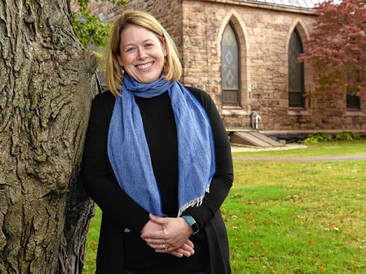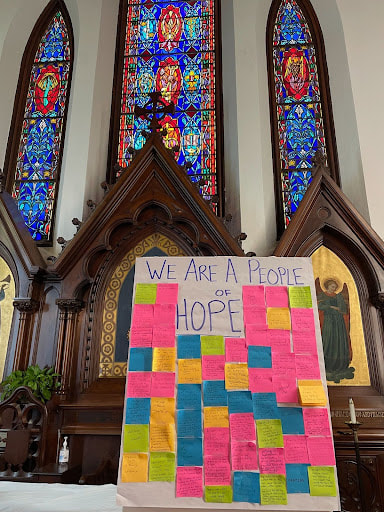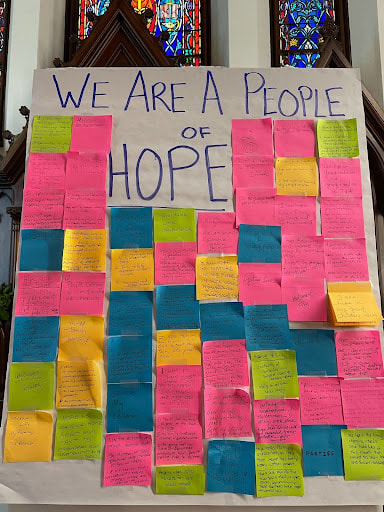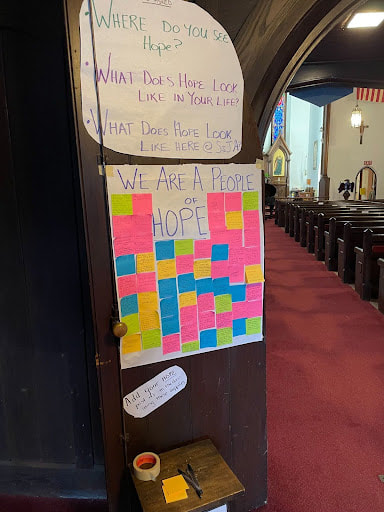|
By Rev. Heather J. Blais, Rector  Today we begin a new church calendar year with the season of Advent. This is a season of anticipation. Anticipation that will be symbolized in…
Over the next four weeks, we will watch the shadows lengthen. We will eagerly await and remember…
In recent weeks, we’ve been reflecting on our shared Christian hope, and how we wait faithfully, as we live into the vast expanse of time between Jesus’ life, death, and resurrection and the end of time when God’s purpose for this world will be fulfilled. Today’s gospel lesson pushes us to take waiting faithfully a step further. The passage takes place in Jesus’ final days. He is reminding the disciples to be alert, as he’s already told them everything they need to know about the completion of God’s purpose on earth. He then uses the fig tree as an example of what signs to look for, and then immediately shifts into another example that is vague - leaving listeners a bit confused about what signs they are to be looking for exactly. Commentator Timothy Adkins-Jones suggests this mixed messaging is actually offering listeners some very concrete advice: “...we are to stay ready so that we don’t have to get ready.”* In other words, we are called to embrace our faith each and every day. We are to live into the rituals and rhythms of prayer, community, and outreach. We are to embody the Way of Love, and to hold onto our shared Christian hope, knowing one day, God’s dream of peace, justice, and love will come to fruition. Our diocese recently held a webinar, featuring the Rev. Dr. Jesse Zink, principal at Montreal Diocesan Seminary.** Some of you may have met Rev. Zink, as he grew up in our diocese at St. John’s in Northampton. In the webinar, Rev. Zink spoke with diocesan leaders about hope in the face of a world afflicted with multiple crises. While I commend you to watch it, and will post a link to it with this sermon, I want to share a few of his observations. Rev. Zink began by sharing a relatively new term, polycrisis, which is when crises in multiple global systems become casually entangled in ways that ‘degrade humanity’s prospects’. We regularly pray about these crises: the intensifying conflicts around the globe; the climate crisis; widespread human migration; and the complications and challenges of a consumer driven economy. He asked us: What does it mean to proclaim Christian good news in a time of polycrisis? How do we live out our shared Christian hope? Rev. Zink reminded us that our hope is based on the knowledge and belief that God has acted, God is acting, and God will act in the future. We trust that God will bring about peace, and we hold onto this promise. The question the Church has faced in every generation is: How do we live now in light of what we believe God will do? Rev. Zink also offered some context on what hope is not.
Rev. Zink went on to remind us that in this polycrisis world, it can be hard to believe in a future. Our challenge is to not give into cynicism and despair, as it is not what the Gospel calls us into. The Gospel reminds us we are a people of the Way of Love, and we trust in the knowledge that there is a future, and it is a future worth living for. And this hope shapes our actions and our life now. However, it doesn't magically make things better. In fact, Rev. Zink defined hope as: “... a gritty, engaged, hanging-on-by-the-fingernails, no-options-left ethic for a world that feels uncertain and out of control.” Rev. Zink left us with some advice on how we might lean into our shared Christian hope. He encouraged us to look to the ministry of Jesus of Nazareth:
Rev. Zink’s reflections on hope in a crisis shaped world felt very timely. Everyday we are reminded of the numerous challenges we are facing on a global and national scale, and it is indeed very hard to not become snarky and cynical. Maybe even more burdensome are the personal challenges we carry, and the temptation to do so in silence and isolation. We struggle with the challenges of caregiving, anxiety, depression, enduring grief, relationships ending, financial hardship, and a sense of helplessness around the suffering of our loved ones and neighbors. Despair can feel so close at hand. Yet here we are, carving out time to be together as a community in worship. We gather each week, in worship, to remind ourselves we are a people of hope, we trust in God’s promise of a future grounded in peace, justice, and love. We are fed by the scriptures, prayers, eucharist, and time together as a community. We then go out into the world to be agents of hope in a world grappling with despair. We remind ourselves of God’s dream, and we let it inspire how we live, breathe, and move. We are a people of hope. The world is hungry for hope, and we are uniquely poised to share that hope. To that end, I want to invite everyone to take a couple of minutes to reflect on hope.
The Ushers will hand out post its and pens and I invite you to jot down a word, sentence, or drawing that for you symbolizes hope. When you’re ready, please come and post it on this board, or raise your hand and an usher will take it and post it on the board for you. This board will live in our Narthex throughout the Advent and Christmas seasons. So that anyone who passes through these doors, whether it be for a few minutes of silent prayer during the week, or during worship, they will be reminded that there is hope. Dear ones, there was hope in the beginning, there is hope now, and there always will be hope in the Eternal Source of Love. Amen. Mark 13: 24-37 *https://www.workingpreacher.org/commentaries/revised-common-lectionary/first-sunday-of-advent-2/commentary-on-mark-1324-37-6 ** https://www.youtube.com/watch?v=IHE7Css4Ew4 Comments are closed.
|
We are blessed to have a diversity of preaching voices in our parish. Our guild of preachers is a mixture of lay and clergy. We hope you enjoy the varied voices. Meet our Preachers
All
Archives
July 2024
|


